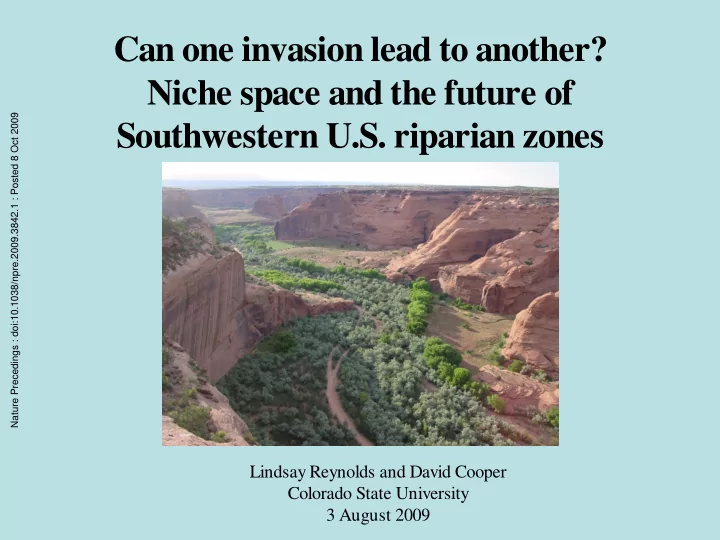

Can one invasion lead to another? Niche space and the future of Nature Precedings : doi:10.1038/npre.2009.3842.1 : Posted 8 Oct 2009 Southwestern U.S. riparian zones Lindsay Reynolds and David Cooper Colorado State University 3 August 2009
Tamarisk and Russian olive Nature Precedings : doi:10.1038/npre.2009.3842.1 : Posted 8 Oct 2009 Friedman et al. 2005. Biological Invasions, 7:747-751
Tamarisk and Russian olive Tamarix ramosissima Ledebour, Elaeagnus angustifolia L. Nature Precedings : doi:10.1038/npre.2009.3842.1 : Posted 8 Oct 2009 T. chinensis Loureiro, (Russian olive) T. pentandra Karst, and hybrids of these taxa
Nature Precedings : doi:10.1038/npre.2009.3842.1 : Posted 8 Oct 2009 National Monument, Canyon de Chelly Arizona
Flood plain changes 1930s-2007 Nature Precedings : doi:10.1038/npre.2009.3842.1 : Posted 8 Oct 2009 1942 Ansel Adams 2005 *Native cottonwood, exotic tamarisk and Russian olive riparian forest
Research goals: mechanisms of invasion (1) Empty niche exploitation? Does Nature Precedings : doi:10.1038/npre.2009.3842.1 : Posted 8 Oct 2009 Russian olive have a broader niche than cottonwood and tamarisk? (3) Facilitation? Can cottonwood and tamarisk facilitate Russian olive invasion by providing shaded habitat?
Methods • Test light and water requirements for tamarisk, Russian olive and Nature Precedings : doi:10.1038/npre.2009.3842.1 : Posted 8 Oct 2009 cottonwood • Fine scale: Controlled experiment • Landscape scale: Canyon de Chelly field survey • Regional scale: Regional survey
Fine scale: Methods • Controlled experiment Nature Precedings : doi:10.1038/npre.2009.3842.1 : Posted 8 Oct 2009 Shade • 0%, 90%, 99% • Water • Saturated soil (flooded) • High monsoon rain • Average rain • Low rain • Species • Russian olive, tamarisk, cottonwood •
Nature Precedings : doi:10.1038/npre.2009.3842.1 : Posted 8 Oct 2009 Fine scale: results
Nature Precedings : doi:10.1038/npre.2009.3842.1 : Posted 8 Oct 2009 Landscape scale: Canyon de Chelly Random location Transects:
Nature Precedings : doi:10.1038/npre.2009.3842.1 : Posted 8 Oct 2009 Regional scale: Sites
Nature Precedings : doi:10.1038/npre.2009.3842.1 : Posted 8 Oct 2009 Full sun sun No Canyon de Chelly and regional field surveys
Nature Precedings : doi:10.1038/npre.2009.3842.1 : Posted 8 Oct 2009 Stable oxygen isotope analysis
Nature Precedings : doi:10.1038/npre.2009.3842.1 : Posted 8 Oct 2009 II – Canyon de Chelly results
Nature Precedings : doi:10.1038/npre.2009.3842.1 : Posted 8 Oct 2009 Continued invasion of Russian olive
Summary 1) Empty niche exploitation? Nature Precedings : doi:10.1038/npre.2009.3842.1 : Posted 8 Oct 2009 Yes - Russian olive has a broader niche than tamarisk • and cottonwood 2) Facilitation? No. • 1942 Ansel Adams 2005
Acknowledgements • The National Parks Service and PRIMES (NSF award #DGE- 0221595003) for funding. Nature Precedings : doi:10.1038/npre.2009.3842.1 : Posted 8 Oct 2009 • My advisor David Cooper and committee members, Tom Hobbs, Cynthia Brown, Tom Stohlgren and Ellen Wohl • Field and technical assistance and the Canyon de Chelly Staff PRIMES
Recommend
More recommend